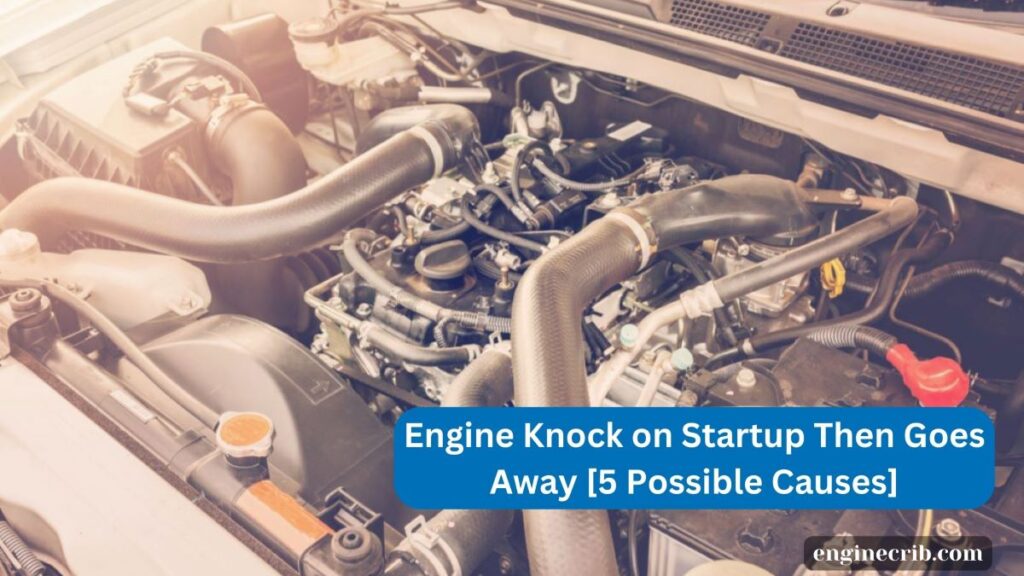Have you ever heard a knocking sound from your car engine when you start it up, but the noise goes away after a few moments?
This situation is commonly referred to as “engine knock on startup,” and it can sometimes be a sign of a serious problem.
In this blog post, we will explore the possible causes of engine knock-on startup, its potential consequences, and the solutions to address it.

Table of Contents
What is Engine Knock?
The engine knock-on startup is a metallic rattling or knocking sound that occurs when you start your engine. It is an unusual noise that comes from the engine when the fuel inside the cylinder is not burning properly.
When you start your car, you expect a smooth engine startup, but sometimes, you may hear a knocking sound. The sound is usually more pronounced when the engine is cold, and it goes away as the engine warms up.
This can be caused by a variety of factors, including low engine oil, faulty fuel pump and worn engine parts.
5 Causes of Engine Knock on Startup
1. Low Engine Oil
Low engine oil levels can cause the engine to knock on startup. This is because the oil is responsible for lubricating the engine’s moving parts, and without enough oil, the engine parts can rub against each other, causing the knocking sound.
2. Faulty Fuel Pump
If the fuel pump is not delivering enough fuel to the engine, it can cause the engine to knock on startup. This is because the engine is not getting enough fuel to run smoothly. Once the engine warms up and the fuel pump delivers enough fuel, the knocking sound may go away.
3. Spark Plug Issues
Faulty spark plugs or incorrect spark plug gaps can cause the engine to knock on startup. This is because the spark plugs are responsible for igniting the fuel in the engine’s cylinders, and if they are not working properly, the engine may not run smoothly. Once the engine warms up and the spark plugs start working properly, the knocking sound may go away.
4. Carbon Buildup
A buildup can cause the fuel to ignite prematurely, which can cause a knocking sound. Carbon buildup refers to the accumulation of carbon deposits within the engine’s cylinders, usually caused by incomplete combustion of fuel and oil.
Over time, this buildup can become excessive and interfere with the normal operation of the engine. Thereby affecting the engine performance in several ways, including decreased power output, and engine knock.
Once the engine warms up and the carbon buildup is burned off, the knocking sound may go away.
5. Sticky Valve Lifter
A sticky valve lifter can cause a single knock or tapping noise when the engine is started. This occurs when there is a problem with the oil supply to the lifter or the lifter itself.
The valve lifter, also known as a tappet or lifter, is an essential component of your car’s engine. It controls the valve’s opening and closing and ensures the engine runs smoothly.
However, when the valve lifter becomes sticky or malfunctions, it can cause problems, including engine noise and reduced performance.
Some common causes of a sticky valve lifter include lack of oil, contaminated oil and a Worn-out lifter. Regular maintenance, including oil changes and valve clearance adjustments, can help prevent sticky valve lifters and ensure proper engine performance.
How to Fix the Engine Knock On Startup Issue
1. Check the Oil Level
Ensure that your vehicle has the correct amount of oil and that the oil is of the right type for your vehicle.
2. Replace Worn Engine Parts
If the knocking sound is due to worn-out engine parts, such as pistons or bearings, they should be replaced promptly to avoid further damage.
3. Inspect the Engine Lifters
Start by unlocking and opening the engine bay. Once you have access, visually locate the engine lifters and carefully examine them. Make note of any visible signs of wear or damage, such as cracks or excessive wear on the lifter faces.
4. Replace Spark Plugs
Worn or faulty spark plugs should be replaced to prevent misfiring in the engine.
5. Clean the Engine
Regular cleaning of the engine, including the combustion chamber and the pistons, can help prevent carbon buildup and reduce knocking sounds.
Consequences of Ignoring Engine Knock on Startup
Ignoring engine knock-on startup can lead to serious consequences such as engine damage, reduced fuel efficiency, and increased emissions. The knocking sound is an indication that something is wrong with the engine, and it is essential to address the issue promptly to prevent further damage.
FAQs
Can Engine Knock-on Startup be Fixed?
Yes, engine knock-on startup can be fixed by identifying and addressing the underlying cause.
Is Engine Knock-on Startup a Severe Issue?
It can be a sign of a severe issue, such as engine damage or worn-out components. It’s essential to have it checked out by a mechanic to identify the root cause.
Can Engine Knock Cause Engine Failure?
Yes, if left unchecked, engine knock can cause engine failure, leading to costly repairs or even engine replacements.
How Often Should I Clean My Engine to Prevent Carbon Buildup?
It is recommended you clean your engine every 20,000 miles, depending on your car’s model or brand, to prevent carbon buildup.
Read: Car Touch Screen Not Working [Causes & Fixes]
Conclusion
Engine knock-on startup can be an indication of a more significant problem with your vehicle. By understanding the causes and solutions to engine knock, you can take appropriate action to prevent further damage to your vehicle.
Regular maintenance, using high-quality fuel, and checking your engine oil levels can help prevent engine knock and keep your vehicle running smoothly. If you notice an engine knock on startup, it’s essential to have it checked out by a professional mechanic to avoid potential engine damage.